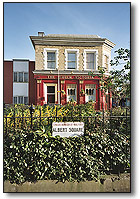|
Eastenders 
|
One of the regular jobs I have continued to work on in 2004 is BBC TV's most popular drama, Eastenders. With average audiences regularly over ten million viewers, Eastenders needs no introduction. |
|
Channel 4 racing |
My first job of 2004 on the 1st of January was working on Channel 4's horse racing coverage for Highflyer Productions at Cheltenham and I have continued to work for them at other Courses throughout the spring and summer. It's always a pleasure to be involved with Channel 4's racing coverage as not only is it very well respected both by the racing industry and punters alike, but also Highflyer's courteous professionalism is a breath of fresh air in a sometimes fraught industry. The whole team always find ourselves welcomed at Courses which makes our job so much easier. |
|
6 Nations Rugby Union Championship |
Early February saw a call from BBC Resources to go to Rome to cover England's first match in the 6 Nations Rugby Union championship. Jobs like these always sound glamorous, the reality is usually different. You are expected to travel for long hours and on arrival immediately start work, making the days very long indeed. Flights are usually at inconvenient times and the only opportunity to see any sights is if the taxi rushing you to or from the airport passes anything of interest. Even finding a restaurant to have dinner in was difficult in the evenings, due to the number of visitors. |
|
Faust |
Working on operas is a rare treat for the music loving cameraman. I was fortunate enough to be asked to work for the BBC on The Royal Opera House's acclaimed new production of Gounod's Faust, staged by David McVicar. The production was broadcast live on the 18th June. Rehearsals of the four hour long opera had to fit in with the opera house's schedule, so our two rehearsals spread over almost two weeks, just remembering the shots was a trial in itself. |
|
Wimbledon Tennis Championship |
Back to SW19 for two weeks at the end of June for the Wimbledon Tennis championships again. When the sun shines there are few better sports to be working on as a cameraman than tennis. However this year we had more than our fair share of rain and had to find ways to amuse ourselves throughout numerous long breaks in play. |
|
Opera from Glyndebourne |
If working on Opera is a treat, working at Glyndebourne is the real icing on the cake. Glyndebourne is a small but wonderful opera house set discretely in the beautiful Sussex downs. The auditorium is perfectly sized, not too large as to be impersonal and imposing, but small enough to be intimate and for the acoustics to be just perfect. This year's live broadcast included productions of Rachmaninov's The Miserly Knight and Puccini's Gianni Schicchi. The first was a dark brooding piece which tested our focusing ability to the limit. The second was a much brighter piece, but performed at a frantic sit-com pace with over 550 shots in less than 50 minutes. |
|
The Proms |
"The World's Greatest Classical Music Festival" is how the Proms are billed. This year there was even greater coverage of the festival on television, not only the usual concert relays on BBC2, but also three weeks of coverage on the BBC's digital channel BBC4. As ever with the Proms, there was never enough rehearsal time for TV. This meant we often find ourselves going live with unrehearsed complex shooting scripts. A testing time for all the team. This year were lucky to be using the BBC's first High Definition outside broadcast unit. Although the transmissions are in standard definition, the improved picture quality has been a joy to watch. |
|
Breast Cancer; The Operation |
BBC3's Cancer awareness week of programmes in October covered a wide range of programming. A major part of the schedule was devoted to a three hour special about breast cancer. The programme followed a woman through a double mastectomy and reconstuctive surgery . The programme followed on screen the operation as it progressed with multiple windows on screen showing different views of the procedure. Televising any procedure in an operating theatre is always a huge challenge for TV. It is absolutely critical that the TV production isn't alllowed to interfere with the procedure or hinder the surgical staff in their work. So lighting is often less than ideal for TV, space is always a problem, conforming to the protocols for cleanliness and avoiding any risk of infection adds an extra complexity to normal working practices. |
|
Other recent work |
Whilst it's nice to be able to display some pictures of the programmes I've worked on, it's not always possible. So here a few other programmes I've worked on already this year.
|